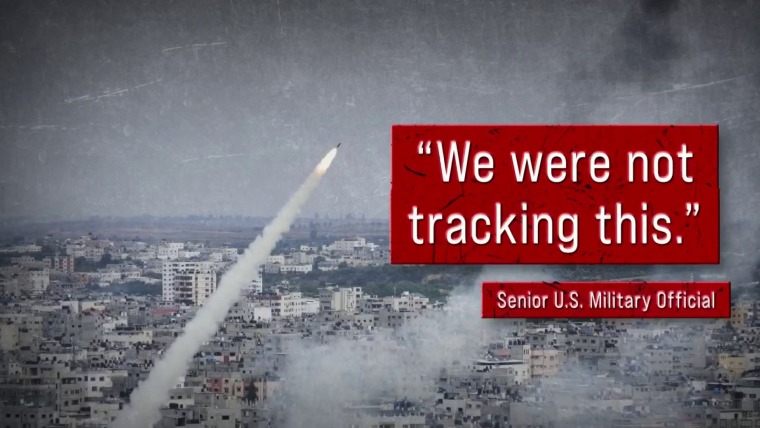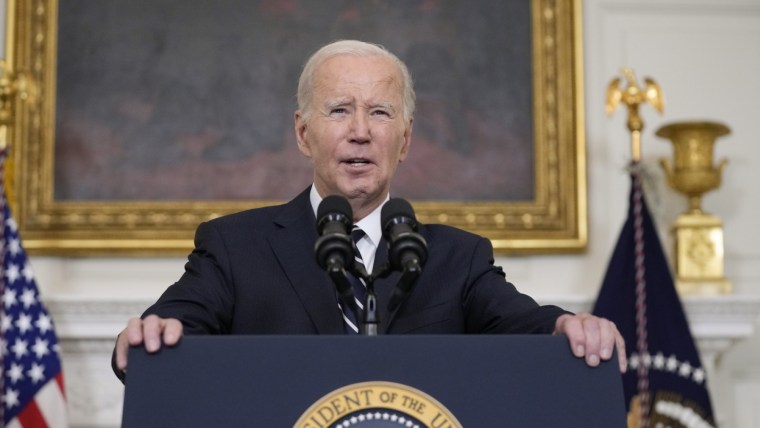[ad_1]
WASHINGTON — Presidential races don’t normally hinge on crises in distant nations, but the armed conflict that broke out in Israel threatens to undercut Joe Biden’s argument that his foreign policy expertise is making the world more secure.
The attacks launched by Hamas fighters expose deficiencies in Israeli intelligence, experts said, while raising fresh questions about what the U.S. is getting in return for the time spent building surveillance capabilities and partnerships in the volatile Middle East.
“This is an enormous intelligence failure by the Israelis and the Americans,” said Bruce Riedel, a former CIA officer and Middle East specialist. “I don’t see any reason to believe that either Washington or Jerusalem had any expectation this was coming.”
Follow live updates on Israel here.
As a sitting president who pledged to restore competence in the foreign policy arena, Biden now faces accusations from political opponents that global trouble spots are multiplying on his watch.
Polls show that Americans are turning against the Biden administration’s arms deliveries to Ukraine in its grinding war with Russia. A U.S. Air Force general predicted in a memo in January that the U.S. and China could be at war by 2025.
And a Biden administration initiative to normalize relations between Israel and Saudi Arabia is in danger of unraveling. If Israel’s war with Hamas results in the deaths of Palestinian civilians in Gaza, the Saudis may sour on the idea of improving ties to the Jewish state.
“The [Biden] administration has spent an enormous amount of effort to work on an Israeli-Saudi normalization agreement,” Riedel said. “That’s probably dead in the water now. Once there are pictures of hundreds of Palestinian casualties — including women and children — the Saudi population is not going to be willing to accept a normalization agreement.”
Republican presidential candidates were quick to fault Biden after Hamas launched its attack. GOP frontrunner Donald Trump’s campaign put out a statement focusing on the $6 billion in Iranian oil revenues that the U.S. had frozen through sanctions. Iran has historically funded Hamas, with whom Israel is now at war. In exchange for releasing the money, Iran agreed to let five imprisoned Americans return home.
“One month ago, President Trump warned that Joe Biden’s weakness and $6 billion payout to Iran would ‘be used for terrorism all over the Middle East,’ ” the Trump campaign statement said. “That’s exactly what is happening now.”
There is no evidence that the $6 billion helped finance the attacks. The money can be used only for medicine, food and humanitarian purposes under the conditions placed on its release, U.S. officials said. Yet in an interview with NBC News, Iranian President Ebrahim Raisi said his government would decide how it would spend the $6 billion.
“These funds have absolutely nothing to do with the horrific attacks today and this is not the time to spread disinformation,” Adrienne Watson, a spokeswoman for the White House’s National Security Council, said in a social media post.
Biden’s approach to Iran figures to get more attention as the hostilities with Hamas unfold. He has faced demands from Arab countries and Israel to toughen his posture toward Iran as he tries to revive a nuclear deal reached when he was Barack Obama’s vice president. In 2018, Trump pulled out of the deal, which was meant to stop Iran from developing nuclear weapons.
In a video released Saturday, Florida Gov. Ron DeSantis, another presidential candidate, said that Biden’s policies “have gone easy on Iran and helped fill their coffers.”
“We are going to stand with Israel as they root out Hamas and we need to stand up to Iran,” DeSantis said.
Facing one of the most perilous foreign policy crises of his term, Biden spoke directly to Israeli Prime Minister Benjamin Netanyahu Saturday morning. Later in the day, he gave a brief television address from the White House, saying that America’s support for Israel is ironclad while warning Israel’s enemies not to “exploit these attacks.”
“The world is watching,” Biden said.
David Rothkopf, a foreign policy analyst who was a senior trade official in the Clinton’s administration, said in an interview: “Everything that happens on a president’s watch has the potential of lifting them up or becoming a problem. These are the kinds of things that have tested previous administrations and that they have faltered about. But so far, in this case, as in the past cases, the response from the Biden administration has been exactly what you would want.”
An open question is whether Biden will sustain the resolve he showed in his Saturday speech. Israel is poised for a fearsome counterattack. Its citizens may expect as much, amid images of Hamas fighters kidnapping Israeli citizens and spirting them back into Gaza.
“This is really something that Israel hasn’t experienced,” David Friedman, former U.S. ambassador to Israel in the Trump administration, said in an interview. Speaking from Jerusalem, Friedman said he had heard about 10 air raid sirens since the conflict started, forcing his family into a bomb shelter. “I can just tell you, people are angry and they’re hurt and they’re feeling very fragile and exposed in ways they haven’t in decades.”
In past fights with Hamas, Israel has encountered international pressure to pull back. If civilian casualties mount this time in Gaza, progressive members of Congress may call on Biden to demand that Netanyahu stand down.
The Biden administration “ought to encourage Israel and support Israel to do what Israel thinks is necessary to restore deterrence and stability to its own country,” Friedman said. “There’s going to be backlash” against Israel. “There’s huge interest among many of Israel’s enemies — and, unfortunately, some of its friends — in taking the view that Israel acts disproportionately.”
Another complication for Biden is a fraught relationship with Netanyahu that goes back years.
Netanyahu opposed the Iran nuclear deal and praised Trump’s “bold decision” when the ex-president withdrew from the agreement. He also gushed that Trump had made “history” by moving the U.S. embassy from Tel Aviv to the contested Holy City of Jerusalem in 2018.
Biden once insisted he and Netanyahu were “buddies” during a tense point in the Obama administration, but earlier this year, the friction between Biden and Netanyahu came to a head. Biden publicly opposed the prime minister’s contentious judiciary overhaul, which would give more control of the supreme court to Netanyau and his religious and conservative allies. The move triggered massive protests in Israel and at the time, Biden spoke out.
“Like many strong supporters of Israel, I’m very concerned. And I’m concerned that they get this straight. They cannot continue down this road,” Biden said in March.
Biden added that he didn’t think he would be inviting Netanyahu to the White House in the near term.
Now, with Israel facing a grave new military threat, Biden’s job just got trickier: He must manage a delicate relationship with a wartime prime minister, help Ukraine repel Russia’s invasion, and win a race against Republicans eager to paint his foreign policy as a failure.
By his own reckoning, he’s up to the task.
Earlier this year, Biden had this to say about his bona fides: “I’m going to say something outrageous. I think I know as much about American foreign policy as anybody living, including Dr. [Henry] Kissinger,” former secretary of state in the Nixon administration. “That’s what I’ve done my whole life — for the last 270 years.”
[ad_2]
Source link





